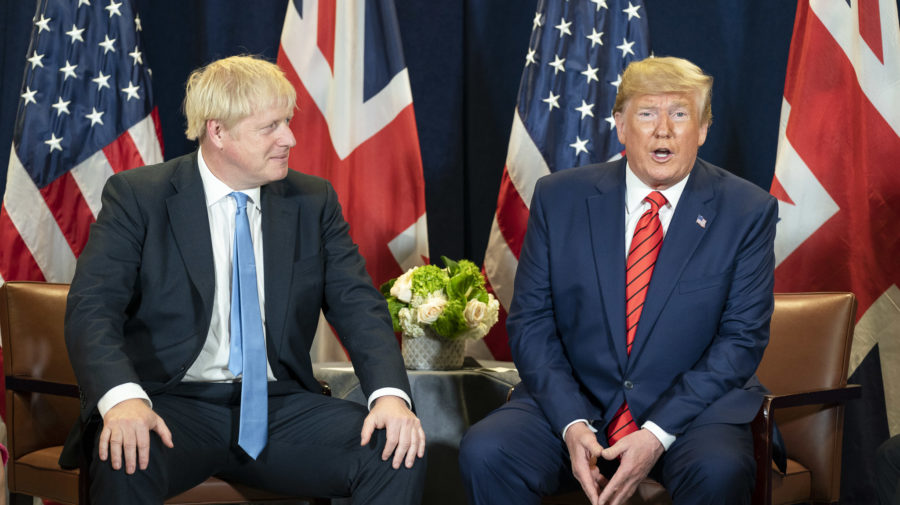Hundreds of newly created and pro-Trump Twitter accounts rallied behind Boris Johnson on Thursday in activity deemed “suspicious” by a number of experts familiar with online manipulation.
Over 400 Twitter accounts that bear hashtags in support of the US President retweeted the British Prime Minister as he declared he had agreed the terms of the Withdrawal Agreement with EU leaders to “get Brexit done”. The House of Commons is set for a knife-edge vote on the deal today as it sits on a Saturday for the first time in 37 years.
The hashtags #TakeBackControl and #BrexitDeal were both trending in the UK after Mr Johnson announced the news on Twitter, but then began trending in the US on Thursday at 7:44 am New York time, according to TrendsMap.
We’ve got a great new deal that takes back control — now Parliament should get Brexit done on Saturday so we can move on to other priorities like the cost of living, the NHS, violent crime and our environment #GetBrexitDone #TakeBackControl
— Boris Johnson (@BorisJohnson) October 17, 2019
An investigation by First Draft for the CrossCheck project found over 1,000 accounts which retweeted Mr Johnson’s message were created in 2019 and more than 800 since June. Some 408 accounts contained hashtags associated with President Trump.
Among all 12,000 of the accounts which retweeted Mr Johnson, the most popular hashtag featured in profiles was #MAGA (Make America Great Again), followed by #KAG (Keep America Great), and #Brexit.
In total, roughly 10% of all accounts which retweeted the Prime Minister used a hashtag in their profile, of which 35% were pro-Trump. Downing Street did not respond to requests for comment in time for publication.
“Whether this is a case of US citizens strongly identifying with Johnson’s message, or something more suspect is difficult to discern,” said James Allen-Robertson, a digital sociologist at the University of Essex. “Distinguishing real activity from co-ordinated or automated activity is a complex task.”
Samantha Bradshaw, a researcher at Oxford University’s Computational Propaganda Project, said some “MAGA accounts” are “part of commercial botnets that are bought and sold to drive trends around a particular topic”.
“If these accounts seem to be new, and tweeting about several issues, they might be part of some kind of botnet-for-sale,” she added.
Nearly 12% of all unique accounts which shared Johnson’s initial tweet — some 1,330 — were created in 2019, a number Marco Bastos, a senior lecturer at London’s City University, called “suspiciously high”. However, only 8% of the so-called “MAGA” accounts were created in 2019.
Other popular hashtags among the accounts included #Trump2020 and #WWG1WGA, a commonly used acronym among the QAnon movement of conspiracy theorists, as well as #2a, associated with the US Constitution’s Second Amendment on gun control, #QAnon and #Trump. #BritishIndependence and #BackBoris also featured in the top ten.
“They [the American related accounts] might also be part of a right-wing, nationalistic network,” said Bradshaw. “I know in Canada, we see some of the MAGA accounts getting involved in spreading messages about the Canadian election, but there hasn’t really been much research on these kinds of groups and how/why they do ‘foreign interference’.”
This kind of transnational support and activity on Twitter isn’t distinct to one particular ideology or another. Bastos, who has studied protest activism and disinformation on Twitter, said he has seen progressive activists around the world retweeting each other’s tweets, amplifying their messages.
Dr Jonathan Bright, a senior research fellow at the Oxford Internet Institute, agreed the activity may be “organic”.
“There is a transnational identity here. There are real people behind this who perceive themselves as part of a transnational movement.” Dr Jonathan Bright, Oxford Internet Institute
“There is a, let’s say, a transnational ideological connection between Trumpism and Brexit and various other types of, let’s say, nationalistic movements around the world. These things are ideologically connected. There are genuine people that support both of them,” said Bright.
Bright has seen similar activity elsewhere in the world, including in India where he looked into Indian Diaspora accounts supporting Prime Minister Narendra Modi.
“It was quite interesting to find out how much they were connected to the Trumposphere, so using these types of hashtags, like MAGA, etc.,” said Bright.
“And also related to Brexit. This was before Boris was in charge, so it was more of a link to Farage and Brexit. There is a transnational identity here. There are real people behind this who perceive themselves as part of a transnational movement.”
#takebackcontrol is now trending in United Stateshttps://t.co/ovuuZQGXlJ pic.twitter.com/PDEi56HaDN
— Trendsmap USA (@TrendsmapUSA) October 17, 2019
In June, research organisation ISD Global identified “bot-like” behaviour among the Twitter accounts most regularly engaging with Mr Johnson as he campaigned to lead the Conservative Party.
Party chairman Brandon Lewis said hundreds of “paid tweeters” had been hired in early 2018 to “take on [Labour leader] Jeremy Corbyn’s supporters on social media”, according to The Telegraph.
Co-ordinated and transnational online activity on social media has become a hallmark of political campaigning in recent years, and a September 2019 report co-authored by Bradshaw found more than 70 countries — including the US and UK — have engaged in “organised social media manipulation”.
Facebook is the “platform of choice” for many countries, according to the report, although restrictions on the data researchers are able to access makes it much more difficult to analyse.
“This stuff connects together in ways that we are only starting to understand and really get to grips with,” said Bright.
Methodology
Using Twitter’s API, First Draft scraped 12,497 retweets of Boris Johnson’s first tweet announcing: “We’ve got a great new deal that takes back control,” published on Thursday at 10:35 am, along with the two hashtags #GetBrexitDone and #TakeBackControl. First Draft then used Python and Pandas (a Python programming language for data analysis) to look deeper into the data.
First Draft’s CrossCheck initiative is investigating online disputed content and working collaboratively with newsrooms. Find out more and get in touch if you would like to nominate your newsroom.
Stay up to date with First Draft’s work by becoming a subscriber and following us on Facebook and Twitter.






